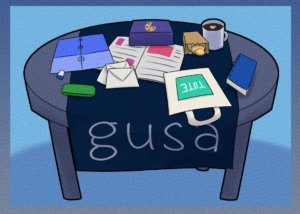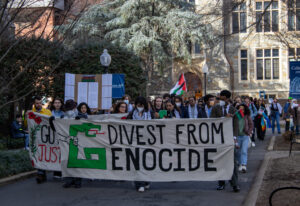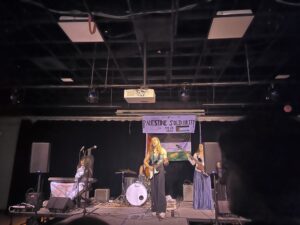In response to former Israel Prime Minister Ehud Olmert’s campus visit, Georgetown’s Students for Justice in Palestine (SJP) organized approximately 25 protestors in front of the Rafik B. Hariri building shortly after 12 p.m. on Oct. 16.
What the university considered to be an open dialogue about establishing peace, concerned students considered “normalization” of anything less than a liberated Palestine.
“We don’t want to normalize ‘peace’ plans that inherently undermine the sovereignty and the safety of the Palestinian people,” Ian Crowley (CAS ’28), a member of SJP, said.
While there have been numerous attempts to end the conflict, the latest U.S.-proposed ceasefire went into effect on Oct. 10. A little over a week later, on Oct. 19, Israeli forces launched a wave of retaliatory strikes, claiming Hamas militants had killed two soldiers. Most recently Israel launched another strike on the Gaza Strip on Oct. 28, killing over 100 people. Hamas released a comment the same day, acknowledging the violation of the agreement, but reiterating their commitment to the ceasefire.
Olmert served as Israel’s prime minister from 2006 to 2009. In 2008, he proposed a peace agreement with Palestinian President Mahamoud Abbas based on the idea of a two-state solution.
While this never came to fruition, in 2024, Olmert and former Palestinian Foreign Minister Nassar Al-Kidwa developed a joint proposal for a political solution to Israeli-Palestinian conflict. Georgetown invited both officials to discuss their proposal.
While Olmert was invited as an advocate for peace, students at the protest argue that his own history should not be forgotten.
“We tend to platform these so-called ‘more liberal, more peaceful, and more moderate’ figures. Is it because of the extremism we’ve seen from Netanyahu’s Likud party?” Crowley said. “We completely forget about how they’ve played a role in maintaining the occupation and the subjugation of the Palestinian people.”
In May 2002 the Central Committee of the Likud voted that “No Palestinian state will be created west of the Jordan [River].” Benjamin Netanyahu, while not prime minister at the time, led supporters of the resolution in insisting that Israel would not allow for an independent Palestinian state in any part of historical Palestine.
Associate professor of Arabic and Islamic Studies Elliot Colla addressed protesters. He read a list of grievances with Olmert, including Olmert’s role in Operation Cast Lead, the 22-day Israeli military offensive in the Gaza Strip in 2008. The operation killed approximately 1,400 Gazans.
Colla referred to Georgetown’s platforming of Olmert as a “disgrace.” He encouraged students to think critically about how the university is spending their tuition money and who they are paying to host influential discussions on campus.
“There are countless people they would never allow to speak here because of the violence that they’ve committed against certain populations, but for some reason, when it comes to Palestinians, that violence is acceptable and that violence is something that we can have a peaceful dialogue about,” an SJP representative, who was granted anonymity for fear of retribution, said.
Around 12:45 p.m., the crowd ascended the outdoor staircase to the Lohrfink auditorium entrance, where GUPD officials blocked the doorway.
“The energy was high and people were engaged with the speeches,” another SJP representative requesting anonymity said. “Energy and agitation increased when we watched as our fellow students were profiled and interrogated by GUPD on the terrace.”
While student speakers continued chanting phrases like “No, no normalization, we demand full liberation” into a megaphone, GUPD asked SJP leadership to retreat from the terrace. The group returned to their original meeting place outside of the main entrance.
Two student, acting independently from SJP, attempted to enter the Lohrfink auditorium area, carrying balloons in the Palestinian flag colors. GUPD officers are shown on video physically removing the students, after the students attempted to pass through a barricade.
“Non-registered individuals attempted to disrupt the event, requiring GUPD officers to remove them from the entrance of the event,” a university spokesperson wrote to the Voice. “GUPD officers are trained in deescalation and only make physical contact if necessary when a student violates verbal instructions, breaches a secured zone, or compromises the safety of another member of our community.”
A second SJP representative emphasized that despite the growing obstacles the club may face when protesting, they plan to continue making their demands known to the university.
“Following the incident, SJP is more emboldened to continue to pressure the university into disclosing, divesting, repealing repressive policies, and stopping the platforming of war criminals and profiteers,” the representative said.





